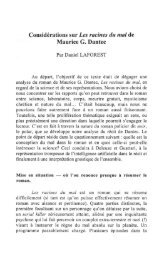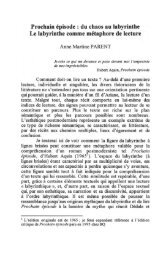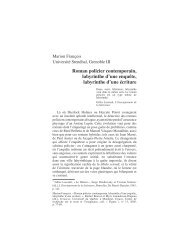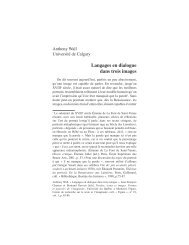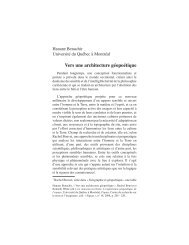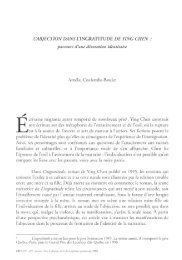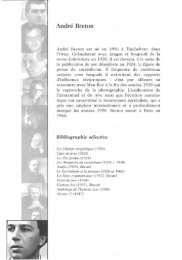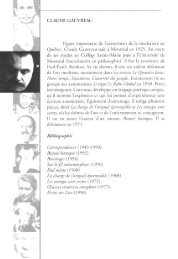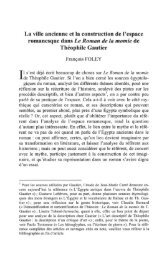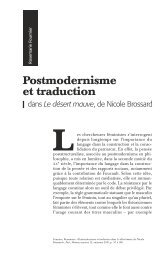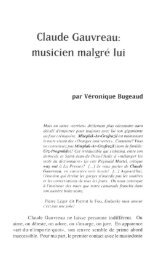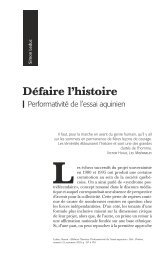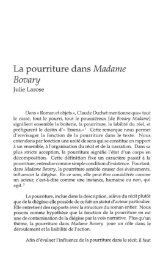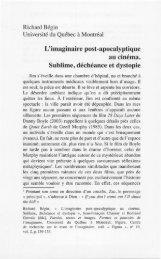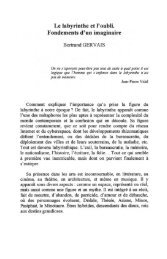Seeing and Believing in Dostoevsky's The Idiot - Observatoire de l ...
Seeing and Believing in Dostoevsky's The Idiot - Observatoire de l ...
Seeing and Believing in Dostoevsky's The Idiot - Observatoire de l ...
Create successful ePaper yourself
Turn your PDF publications into a flip-book with our unique Google optimized e-Paper software.
SEEING AND BELIEVING<br />
his project to his beloved niece Sofia Ivanova <strong>in</strong> the follow<strong>in</strong>g<br />
terms:<br />
<strong>The</strong> i<strong>de</strong>a of the novel is an old <strong>and</strong> favourite one<br />
of m<strong>in</strong>e, but such a hard one that for a long time<br />
1 didn't dare take it up, <strong>and</strong> if 1 have taken it up<br />
now, then absolutely because 1 was <strong>in</strong> a nearly<br />
<strong>de</strong>sperate situation. <strong>The</strong> ma<strong>in</strong> i<strong>de</strong>a of the novel is<br />
to portray a positively beautiful person. <strong>The</strong>re's<br />
noth<strong>in</strong>g more difficult than that <strong>in</strong> the who le<br />
world, <strong>and</strong> especially now. Ali the writers, <strong>and</strong><br />
not just ours, but even ail the European ones,<br />
who ever un<strong>de</strong>rtook the <strong>de</strong>piction of a positively<br />
[italics are Dostoevsky 's 1beautiful person, always<br />
had to pass. Because it's a measureless i<strong>de</strong>al. <strong>The</strong><br />
beautiful is an i<strong>de</strong>al, <strong>and</strong> the i<strong>de</strong>al-both ours <strong>and</strong><br />
that of civilized Europe-is far from hav<strong>in</strong>g been<br />
achieved. <strong>The</strong>re's only one positively beautiful<br />
person <strong>in</strong> the world-Christ, so that the appearance<br />
of this measurelessly, <strong>in</strong>f<strong>in</strong>itely beautiful person<br />
is <strong>in</strong> fact of course an <strong>in</strong>f<strong>in</strong>ite miracle.'<br />
Dostoevsky goes on <strong>in</strong> this letter to i<strong>de</strong>ntify a reveal<strong>in</strong>g<br />
genealogy for his novel, compris<strong>in</strong>g Don Quixote <strong>and</strong> the<br />
" <strong>in</strong>f<strong>in</strong>itely weaker" but nevertheless "enorlnous" achievement<br />
of Dickens's Pickwick. Both of those, he argues, succeed<br />
because they present the beautiful <strong>in</strong> the form of the<br />
" ridiculous," the comic, while Dostoevsky has <strong>in</strong> m<strong>in</strong>d a<br />
tragedy <strong>and</strong> presciently adds, "l'm terribly afraid that it will<br />
be a positive failure."4<br />
3 Fyodor Dostoevsky, Complete Lellers: 1868-1871, edited <strong>and</strong><br />
translated by David A. Lowe (New York: Ardis Publish<strong>in</strong>g, 1990)<br />
3: 17.<br />
4 Dostoevsky, Complete Lellers, 17. 1 have chosen to change one<br />
word <strong>in</strong> Lowe's translation of this phrase. While he has "absolute<br />
failure" 1 retum to the more literai "positive failure" (nollO)f(WrellbHlISI<br />
HeYlla'la <strong>in</strong> the Russian) because it more clearly l<strong>in</strong>ks the "failure" of<br />
the novel with the attempt to <strong>de</strong>pict Christ.<br />
[ 110]



